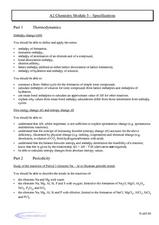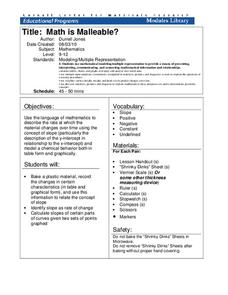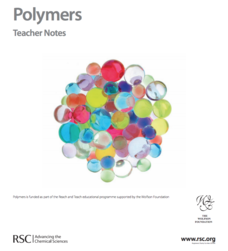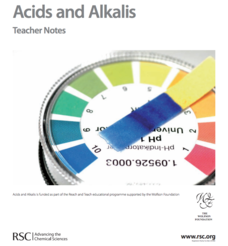Curated OER
A Little Chemistry
The molecular properties of water are the focus of this chemistry-based assignment. Multiple-choice, true-or-false, matching, and fill-in-the-chart style questions query assignees about the forces that hold the water molecule together,...
Curated OER
The Enthalpy of Chemical Change
In this chemical change learning exercise, students review enthalpy and use Hess's law to calculate enthalpy and the heat of reaction for given reactions. This learning exercise has 3 problems to solve.
Curated OER
Chemical Bonding
Eighth graders identify the three main types of chemical bonds. In this chemistry lesson, 8th graders draw Lewis dot diagrams of elements and determine the bond formed. They create a model water molecule.
Virginia Department of Education
Finding the Formula and Percent Composition
Do you have mole problems? If so, call Avogadro at 602-2140. The lesson starts with pupils working independently to solve for molar mass of ionic compounds. Then they learn to solve for percent composition and later perform an...
Kenan Fellows
How Much Energy Is That Anyway?
The fifth activity in the six part series introduces units of energy including calories, Calories, and joules. Scholars determine the energy released when eating a snack and during activity.
Curated OER
Chemistry Module 5 - Specifications
While this resource does not provide problems for chemistry learners to solve, it outlines skills that they should have and concepts that they should grasp. Topics include thermodynamics, periodicity, redox equilibria, transition metals,...
Cornell University
Polymers: Making Silly Putty
Putty is proof that learning can be fun! Share the wonderful world of polymers with your class through an experiment. Young scientists create their own silly putty, then examine its properties.
Curated OER
Limiting Reagents and Percent Yield Problems
Twelve questions about the various calculations of mass and yield are given here. There is significant practice of molarity calculations and consideration of the reactant and product balance.
Beyond Benign
Packed Up Properties
Determine physical properties of potential packaging materials. Continuing from previous lessons in the series, the resource asks groups to identify physical properties of the substances. They test for conductivity, solubility, water...
Cornell University
Math Is Malleable?
Learn about polymers while playing with shrinky dinks. Young scholars create a shrinky dink design, bake it, and then record the area, volume, and thickness over time. They model the data using a graph and highlight the key features of...
Royal Society of Chemistry
Polymers—Gifted and Talented Chemistry
Polymers are an important part of our day-to-day lives, but how much do your pupils know about them? Learn the basics and beyond in a series of activities designed to build skills in observation, planning, organic chemistry, and bonding.
LABScI
Electrolysis: Splitting Water
Explore the chemical components of water through an electrolysis reaction. Scholars use a battery to divide various water solutions into different gases. As they collect the gases, they measure the volume and make a comparison to the...
Curated OER
Alkyl Halides
In this alkyl halides worksheet, students are given 8 chemical names and they write the structural formulas for each. They are given 12 reactions of alkyl halides and they write the structural formulas for each product.
American Chemical Society
Energy Foundations
Only 10 percent of an incandescent bulb's energy is used to create light; the remaining 90 percent is heat. In the unit of activities, young chemists examine energy through hands-on activities, videos, discussions, and...
Science Matters
Forms of Energy
The amount of energy Americans use doubles every 20 years. The first lesson in a 10-part series teaches scholars about different forms of energy. They rotate through five stations with hands-on activities or experiments at each in order...
Royal Society of Chemistry
Acids and Alkalis—Gifted and Talented Chemistry
Looking for a comprehensive plan for teaching acid-base chemistry? Science scholars discover acid-base interactions through a thoughtfully written unit. The resource is divided into paced activities and individual work designed to...

















